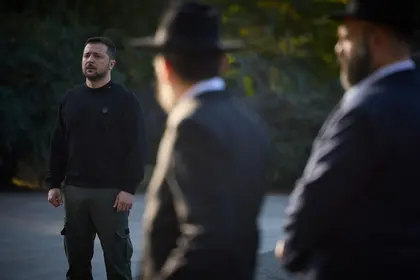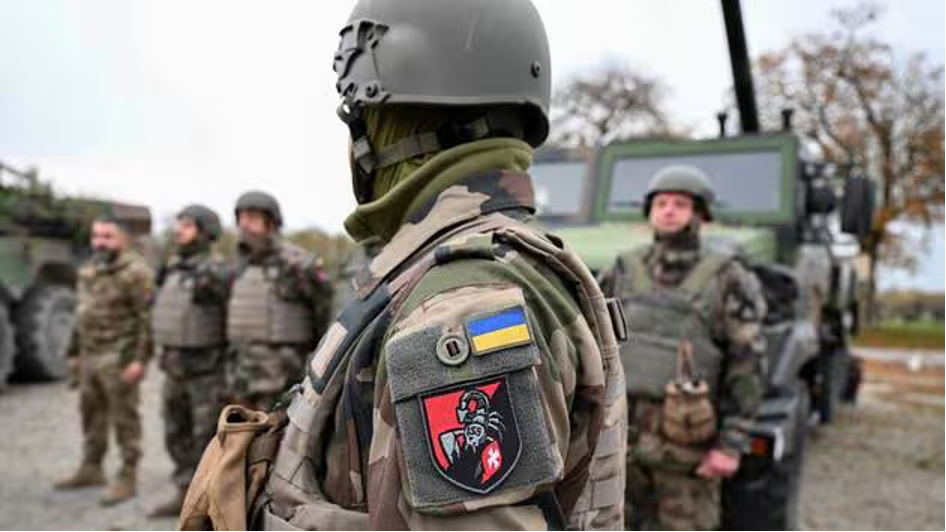President Volodymyr Zelensky joined Ukraine’s chief rabbi Moshe Reuven Azman and those who came to pay their respects at the Babyn Yar Holocaust Memorial on Friday.
JOIN US ON TELEGRAM
Follow our coverage of the war on the @Kyivpost_official.
They were joined by relatives and descendants of the victims of the slaughter, as well as former prisoners of ghettos and Nazi concentration camps. Other rabbis also took part in commemorating the victims of the Nazis.
Sept. 29, 1941 marked that start of almost two years of the killing; as many as 150,000 Ukrainian Jews, Soviet prisoners of war, communists and Roma during the German occupation.
Representatives of Jewish religious organizations read a memorial prayer. Rabbi Azman said he had blessed the President and all Ukrainians.
Today, September 29, on the Day of Remembrance of the Victims of Babyn Yar, the President of Ukraine Volodymyr Zelenskyy, together with the Righteous Among the Nations and the rabbis of the cities of Ukraine, honored the memory of the victims of the Holocaust in Babyn Yar.
— Chief Rabbi Of Ukraine Moshe Azman (@RabbiUkraine) September 29, 2023
At… pic.twitter.com/KdyE0dkMrq
The Rabbi said: “At Babyn Yar, starting on 29 September 1941, more than 35,000 Jews were killed in the first three days.
“The tragedy of the Holocaust leaves a deep mark in the hearts of many, the losses are irreversible and painful, and it is important to remember those who lost their lives in those dark days.
“I blessed the President of Ukraine at this holy place and wished him, on the eve of the Sukkot holiday, strength of spirit, inspiration and God’s protection for the entire Ukrainian people.
“May the blessings of the Almighty accompany Ukraine on the way to peace and prosperity.”
President Zelensky, who is descended from a Jewish family whose members also died under the occupation, said in his comments to survivors and relatives: “Thank you for finding the opportunity to be here today, at the commemoration of the victims of Babyn Yar, Nazi repression, and the Holocaust. I thank the Jewish religious representatives who prayed for the commemoration of the victims of Babi Yar.”

Ukraine-NATO: Common Interests and Challenges on Path to Membership
He said that he noted the heroism of the Righteous Among the Nations, saying: “It is very important to always remember history, not to forget. Because the words ‘Never Again!’ are not empty words.”
Tributes were placed on behalf of the President at the memorial monument to those Jews who were killed by the Nazis in Babyn Yar, and to those of the Ukrainian writer Olena Teliha and the Roma shot by the Nazis.
President Zelesnky at today's ceremony. PHOTO: AFP
What happened at Babyn Yar?
On Sept. 19, 1941, German forces entered Kyiv, which became part of the “Reichskommissariat Ukraine” under Reichskommissar Erich Koch.
Before the war, 160,000 Jews resided in Kyiv, making up 20 percent of its population. Following the start of Operation Barbarossa, Germany’s invasion of the Soviet Union, only about 60,000 remained in the city, primarily those unable or unwilling to flee – mostly women, children, the elderly, or the sick.
A series of explosions in the city center during the first days of the occupation resulted in the death of number of German soldiers. Koch used the sabotage as a pretext to round up and murder those Jews who still remained in Kyiv.
On the night of Sept. 29 SS and German police units guided by of members of Einsatzgruppe C, forced Jews from their homes and marched them to the Babyn Yar ravine which was located just outside the city.
The victims were forced to undress and enter the ravine where Sonderkommando 4a, a special detachment from Einsatzgruppe C commanded by SS-Standartenführer Paul Blobel, gathered them into small groups and shot them. Einsatzgruppe reports forwarded to Berlin formally recorded the deaths of, 33,771 Jews during a two-day period.
The ravine became a killing site for two years after the initial massacre, where tens of thousands of people, including other Jews, patients from a local psychiatric hospital, Roma, Soviet prisoners of war, and ordinary civilians were murdered.
The killings at the Babyn Yar ravine continued until the autumn of 1943, only a few days before the Soviets re-took control of Kyiv on Nov. 6.
You can also highlight the text and press Ctrl + Enter







